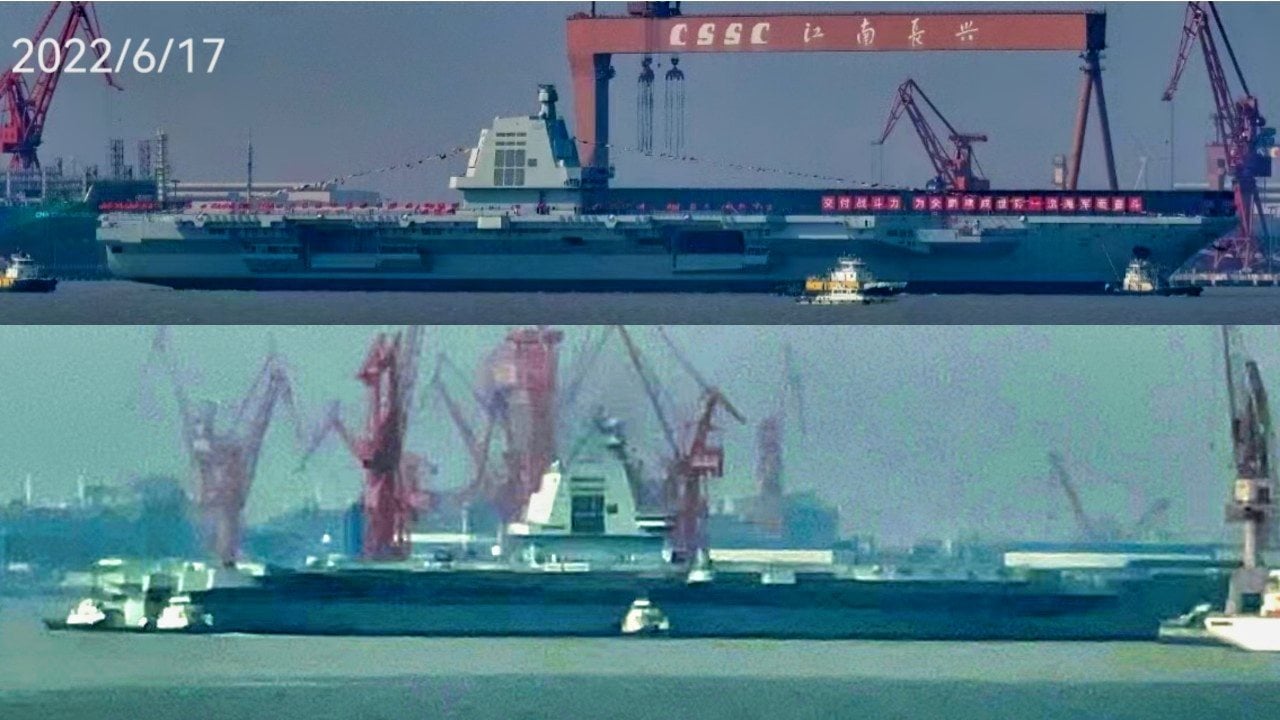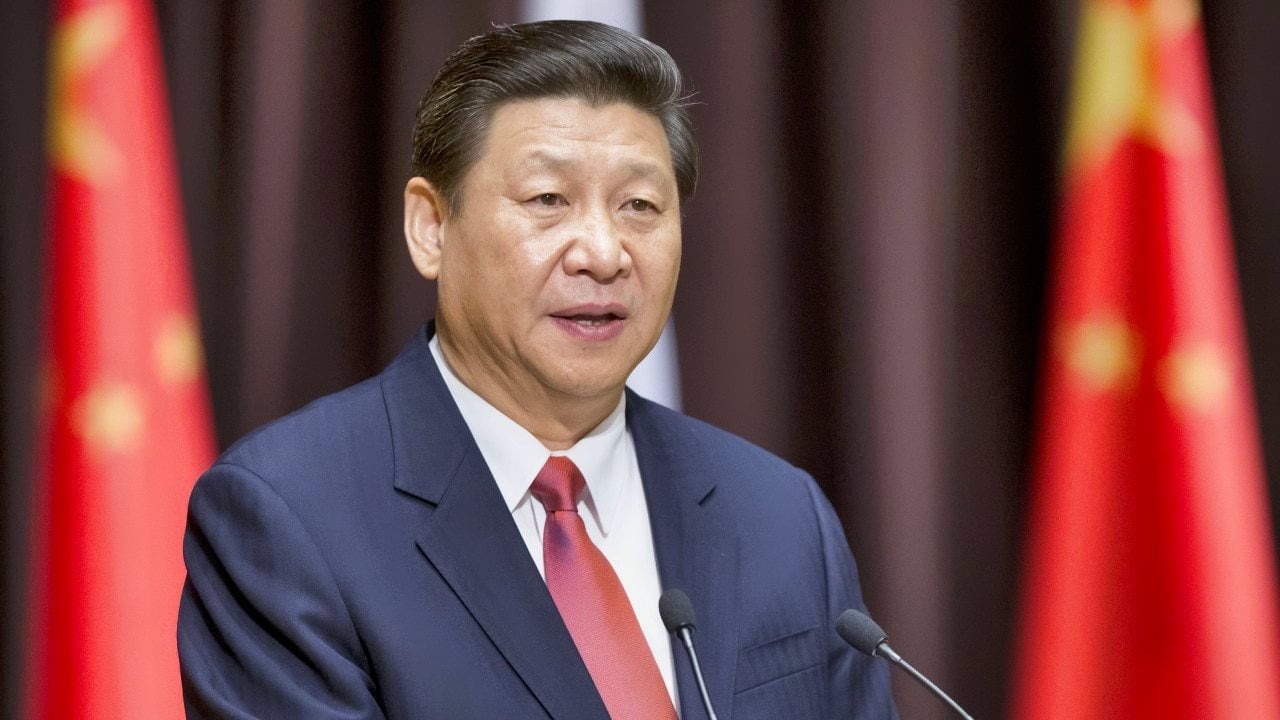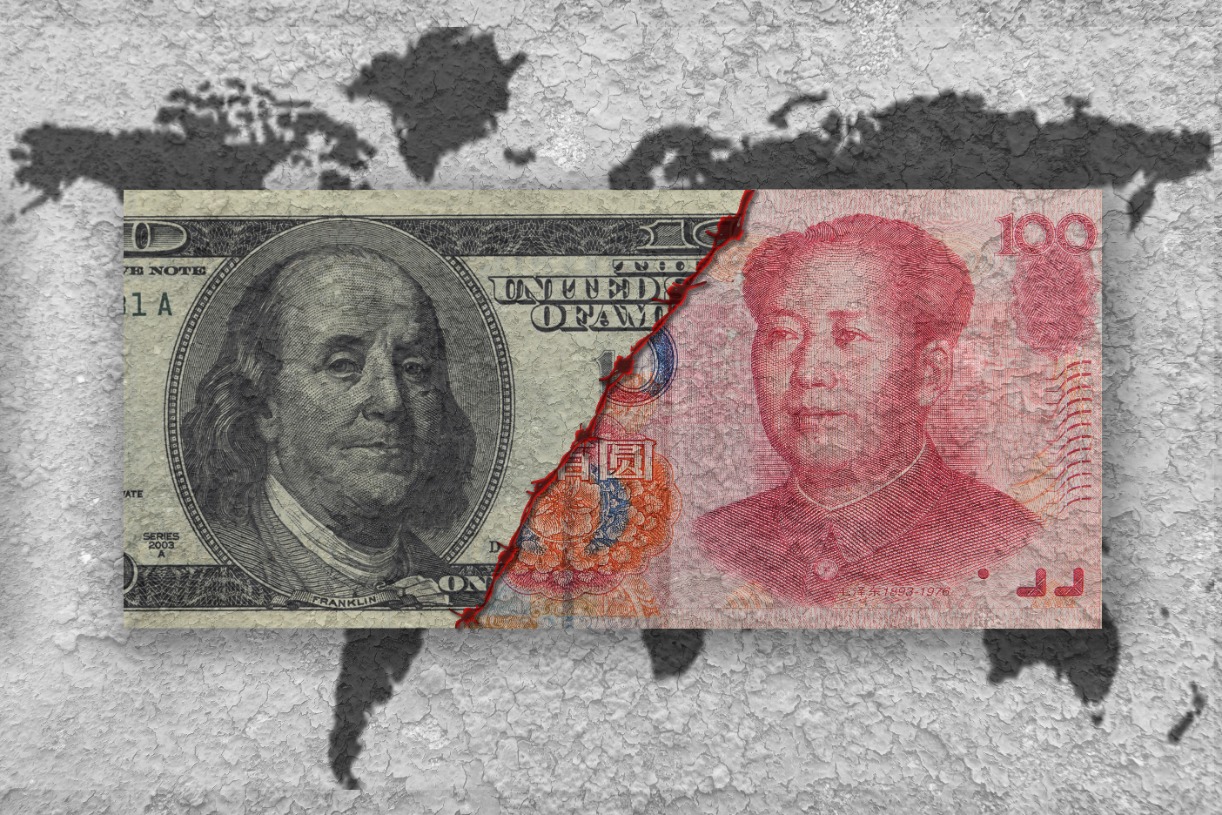Why Trying to 'Defeat' the Chinese Communist Party Could Backfire
Aiming to defeat the Chinese Communist Party, such a strategy could backfire, strengthening the CCP and increasing conflict risks. The preferred strategy is maintaining U.S. dominance through enhanced focus on the Indo-Pacific, innovation, and alliances, while remaining open to engagement with China.
Summary and Key Points: The U.S. faces strategic challenges with China, which aims to reshape the international order. The Biden administration's approach involves managing competition rather than seeking outright victory or confrontation. While some advocate for a more aggressive stance, aiming to defeat the Chinese Communist Party, such a strategy could backfire, strengthening the CCP and increasing conflict risks. The preferred strategy is maintaining U.S. dominance through enhanced focus on the Indo-Pacific, innovation, and alliances, while remaining open to engagement with China.

China dominates the US strategic calculus. It is “the pacing challenge” for the US government and is, warns the Biden administration’s National Security Strategy, “the only competitor with both the intent to reshape the international order and, increasingly, the economic, diplomatic, military, and technological power to do it.” The emergence of competition as the defining feature of the US-China relationship, which dates back to the Trump administration, reflects the failure of the longstanding belief that engagement would facilitate China’s transformation and convergence with Western ideals, notably on democratic governance, a market-led economy, and the existing international order.
The Biden administration, like its predecessor, has not discussed the goal of competition. It has not made clear, in other words, what competition with China is meant to accomplish. Most recently, the administration has said that it is a condition to be addressed rather than a problem to be solved. In that spirit, US officials have talked about the need to “manage competition.” For instance, Kurt Campbell and Jake Sullivan, respectively Deputy Secretary of State and National Security Advisor, have explained that this approach is about the United States seeking “to achieve not a definitive end state akin to the Cold War’s ultimate conclusion but a steady state of clear-eyed coexistence on terms favorable to US interests and values.”
This is the right approach. The United States is best served by pursuing a favorable balance of power with China, i.e., by making every effort to remain dominant over China. So far, however, and despite notable achievements, the administration has not been sufficiently aggressive in that pursuit. More action is urgently needed to ensure that the United States stays ahead of China.
The problem with alternative approaches
Not everyone agrees that Washington is on the right track. In a recent Foreign Affairs article, Matt Pottinger and Mike Gallagher, two of the leading architects of the US policy toward China initiated in the mid-2010s, argue that “The United States shouldn’t manage the competition with China; it should win it.” They explain that as was the case with the Soviet Union yesterday, seeking a balance of power with China today is doomed to fail and that the United States should emulate the Reagan approach and “weaken the sources of [Chinese Communist Party] imperialism and hold out for a Chinese leader who behaves less like an unrelenting foe.”
For Pottinger and Gallagher, then, the United States should shoot for a clear end state with China, one that would entail the defeat of the Chinese Communist Party (CCP) and thus a fundamental transformation of the country.
Is that a wise approach? The short answer is no.

Leaving aside the immense challenge – and likely impracticality – of defeating the CCP, that approach could well have the opposite effect. It could strengthen the CCP’s hold on power, as party leaders would urge the Chinese people to unite against US imperialism. That approach would also considerably heighten the risks of conflict. Plus, even if it paid off, there is no guarantee that a defeated CCP would eliminate the challenges that the United States faces today with China, and new challenges would likely emerge. Significantly, a school of academic research suggests that a democratic China could pose more problems to the United States.
There are two additional issues. First, while Democrats and Republicans agree on the need to compete against China, a shift to a policy of defeating the CCP would be controversial and could shatter the current consensus, costing more to Washington than it hopes to gain. Second, such an approach would also alienate US allies and partners, especially given that many already worry about the intensification of US-China competition. If US officials were to adopt the defeat of the CCP as its stated goal, several allies and partners would likely distance themselves from Washington, reversing years of difficult work which has led to security rapprochement with the United States.
What are the alternatives? Two extreme options can be quickly ruled out: the passive expectation of change, and war. The first entails acceptance of China as it is, animated by the belief that its gradual integration into the international system will dampen its ambitions; blunt its aggressive, expansionist tendencies; and facilitate its convergence with Western values, norms, principles, and practices. That belief drove US policy toward China from the 1970s to the mid-2010s and, as most observers now note, failed to produce the expected results. There is no reason to believe, therefore, that a return of that policy would prove successful today.
Similarly, opting for military conflict – war – with China to forcibly change its regime would be a monumental mistake. There is no appetite for, nor even any consideration of, such an approach among US allies and partners, or in the United States itself, even by those most viscerally opposed to, and critical of, the CCP. Understandably so, as a war between the world’s two leading economies would destabilize the Indo-Pacific and reverberate throughout the globe with disastrous consequences at all levels. Worse, a US-China war could lead to nuclear conflagration, especially given Beijing’s increasingly sophisticated arsenal.
Could the United States and China instead negotiate a condominium, an agreement to share power? The call for “a new model of major country relations” put forward by Beijing when Xi Jinping first came to power is suggestive of this sort of arrangement. The United States rightly rejected it, however, recognizing it as both an attempt to usurp the agency of its allies and partners as well as sew suspicion among them about US respect for their sovereignty and interests.
What’s more, there is no indication that Beijing is prepared to share power with Washington. On the contrary: official Chinese statements and documents have long made clear that China wants to rewrite and dominate the international order. In a speech to the CCP Central Committee on January 5, 2013, for instance, Xi Jinping said:
"We must concentrate our efforts on bettering our own affairs, continually broadening our comprehensive national power, improving the lives of our people, building a socialism that is superior to capitalism, and laying the foundation for a future where we will win the initiative and have the dominant position."
Stay the course, but do much more and go faster
In these circumstances, the best approach to China is the one articulated by both the Trump and Biden administrations, which focuses on establishing a balance of power favorable to the United States. That approach recognizes that ignoring the China challenge is as dangerous and impractical as trying to eliminate it (forcibly or not), and it is clear-eyed about the pitfalls and likely unfeasibility of negotiating a condominium. It accepts that, for now, pursuing a specific endgame with China is pointless and problematic, and that more important is to keep the United States in and ahead of the game, i.e., in a competitive and dominant position vis-à-vis its strategic rival.

Doing so requires the United States to adapt its current approach in important ways, however. It begins with giving a clear-cut priority to China and the Indo-Pacific. The United States has responsibilities and obligations around the world, and it should not abandon allies and partners in other theaters, but a more decisive focus on China and the Indo-Pacific is urgently needed, and long overdue. That’s because of China’s size and its ability to project power and influence and the comparative value of benefits accrued if Beijing assumes preeminence in the Indo-Pacific, which is assuming an increasingly central role in the global economy. Simply put, if China is to be checked or contained, that effort must begin and succeed in its own neighborhood.
The US objective is simple: preventing China from becoming a regional hegemon and, most dramatically, deterring Chinese aggression and expansionism, notably Beijing’s subjugation of Taiwan, an increasingly realistic possibility that would have disastrous consequences for the regional and international orders and could forever eclipse US power and influence. This effort entails the use of all tools of national power commensurate to the threat, and thus to a much higher degree than today. It requires the United States to push back hard against China’s increasingly assertive regional policies and posture and, insofar as possible, deny its power build-up, across the board and in all domains. It also requires the United States to considerably expand its presence and operations in the region. A major funding influx into the Pacific Deterrence Initiative is a related must. Only under $10 billion has been set aside in the next defense budget, which is just 1% more than was spent this year and is below the inflation rate. Calling this insufficient would be an understatement.
The United States must do more than seek to deter China and prevent it from becoming the dominant power, however. It should also focus on improving its competitive position vis-à-vis China to ensure that it maintains or regains the initiative, notably in key areas, such as cutting-edge technologies, the bedrock of power and influence in the twenty-first century. In other words, the United States should make every effort to build, or rebuild, its national strength, not just weaken China’s. To do so, the United States needs a whole-of-government, even whole-of-society, approach that yields the creative use of public resources not only to stimulate and support innovation, but also to adopt and disseminate the fruits of that creativity. Significantly, economic policy must be attuned to the needs of labor and capital, to avoid the disparities and inequalities that can shatter the political consensus that is the foundation of effective action.
Close consultation and cooperation with regional allies, notably Japan, Australia, South Korea, and the Philippines, is another essential component because they are key assets – force multipliers – to help address the China challenge. In recent years, a considerable amount of work has been done to strengthen and adapt US regional alliances. More is needed, however, and the United States must also further expand security ties in the region, thickening relations among what have traditionally been “spokes” in its alliance system. The trilateral mechanisms that have either emerged – the US-Japan-Philippines or Australia-UK-US, known as AUKUS – or been strengthened – the US-Japan-South Korea or US-Japan-Australia – in recent years are an important part of this process, and Washington should work with Australia and Japan to find other “third” parties to develop new security triangles. India, Singapore, and Vietnam are three possible candidates, although each, for different reasons, will be wary of appearing too close to the United States in this endeavor. Thinking creatively about ways to further empower the Quadrilateral Security Dialogue, which includes Australia, India, Japan, and the United States, should also be on the table.
To build a larger coalition that invests – diplomatically, economically, and militarily – in a global order that can counter Chinese claims that its preferred order is more beneficial, notably to the nations that remain agnostic about the burgeoning US-China competition, the United States must do more on the trade front. Ideally, this would include increased access to the US market, as was promised in the Trans-Pacific Partnership, now the Comprehensive and Progressive Agreement on Trans-Pacific Partnership. It has become politically radioactive, however, which is problematic because a key element of China’s attractiveness and the expansion of its international influence is a product of its trade, aid, or investments. The United States is and will thus be hard pressed to match Beijing’s largesse dollar for dollar (even despite Chinese economic difficulties), so it must be able to offer economic benefits to compete effectively with China in this area. Sadly, the trade pillar of the Indo-Pacific Economic Prosperity Framework remains unfulfilled. This gap must be filled. The United States must be seen as a source of prosperity not merely an economic scold. “Just say no to China” is not an international trade strategy.
Critical to all these efforts is communication – to the US public, to the governments and citizens of allies and partners, and to the rest of the world. It is vital that the United States explain the stakes in the competition with China, that success in areas that will determine global leadership and thus the contours of the future world order. In addition to its efforts to better the situation and standing of its friends, China has produced a narrative that argues its preferred vision is superior to that which currently exists. It is explicit about rolling back US power in its efforts to do so. The United States and its partners must counter that claim. It has not yet done so in sufficiently aggressive terms, reasoning that the superiority of our position is self-evident. That is a dangerous mistake.

Finally, it is imperative that in advancing this agenda, the United States remain open to engagement with China, and it should encourage other countries to do the same, offering Beijing the opportunity to play a larger role in regional and global affairs while conditioning that participation on adherence to existing rules, norms, and principles. Some will argue that this is the essence of American arrogance, but it is on the contrary the behavior of a responsible stakeholder within the existing global order. In other words, the United States and its partners must strive to engage China – even if it means dialogue for dialogue’s sake, albeit talking alone cannot come at the expense of action to protect their interests. Even an empty conversation can have value in that it protects against the charge that the United States is unwilling to talk and hence is “the bad guy.”
Back to reality (and realism)
Much of the US foreign policy psyche is anchored in the belief that the United States has a special role to play in the world and that it is able – and should be prepared and willing – to transform others for the better. This isn’t surprising: this mindset, which has its origins in Wilsonian idealism, has enjoyed major successes. After helping defeat Nazi Germany and Imperial Japan during the Second World War, the United States led their transformation into peaceful and prosperous nations and then went on to win the Cold War against the Soviet Union, which turned Russia into a much more benign country, at least for a couple of decades.
To be sure, US strategic blunders in Vietnam, Iraq, and Afghanistan are painful indications of the intrinsic problems associated with that approach. They have done little to convince Washington that it should shift gears, however. Deep down, the belief has persisted that the United States should and will eventually beat and transform its rivals, including China.
For all the talk about “accepting and dealing with China as it is,” powerful voices now argue that the United States must win the competition, and that such a victory requires that Washington pushes Beijing to change fundamentally. The irony is that many of the people making that case – such as Pottinger and Gallagher – pushed for ending the longstanding US policy intended to transform China through engagement. Today, they too advocate that the United States transform China – but through confrontation, not engagement. It is the same policy, albeit a different strategy.
The United States should let go of the dream of defeating and transforming China, a pursuit that would create more problems than solutions. Instead, it should accept the reality that China is and will remain a powerful competitor over the long term and focus on maintaining and, in some areas, regaining a comfortable lead over it. That task – preventing China from becoming the next hegemon – is hard enough, and the United States runs the risk of falling behind if it does not do more and act swiftly.
About the Authors
David Santoro is President and CEO of the Honolulu-based Pacific Forum. Follow him on X at @DavidSantoro1.
Brad Glosserman is Deputy Director of and Visiting Professor at the Center for Rule-Making Strategies at Tama University as well as Senior Adviser (nonresident) at Pacific Forum. Follow him on X at @BradGinTokyo.
All images are from the U.S. Military or Creative Commons.


